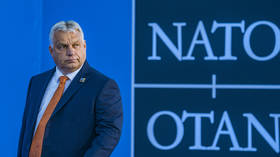Europe brought to its knees by US policy on Ukraine – top Hungarian official
Russia didn’t collapse under Western pressure and has strengthened relations with China, an adviser to PM Viktor Orban said
Europe has been brought to its knees due to the stance taken by the US on the conflict between Russia and Ukraine, a chief adviser to Hungarian Prime Minister Viktor Orban has said.
The policy of ‘blocism’ or the creation of geopolitical alliances “isn’t the solution” in the current situation, Balazs Orban, who is not related to the prime minister, said at the launch of his new book on Tuesday.
It’s “dangerous” for Hungary, which is an EU and NATO member, as it closes off many development possibilities, he explained. ‘Blocism’ also doesn’t strengthen the US, but accelerates the processes of change that are happening in the world, he added.
”We see that Europe has been basically brought to its knees due to the attitude of the US towards the conflict between Russia and Ukraine,” Orban said.
The EU has joined the US in sanctioning Moscow and supplying arms to Kiev since 2022, while also cutting itself off from Russian energy. As a result, the bloc’s economy has taken a hit as it narrowly avoided ending 2023 in recession.
”The current industrial revolutions are based on technologies, which require raw materials that aren’t available in Europe, so the continent is vulnerable,” the aide warned.
”[Meanwhile,] Russia didn’t collapse, was able to diversify its economy, and strengthened its relationship with China,” Orban added.
Hungary should use its position as “a gateway to the EU and the Balkans,” and boost its sovereignty to succeed economically in the coming years, he claimed.
Budapest has taken a neutral stance since the outbreak of the conflict between Russia and Ukraine in February 2022. It condemned Russia’s military operation, but refrained from supplying weapons to Ukraine, while calling for a diplomatic solution to the crisis. The Hungarian authorities also criticized sanctions on Moscow, arguing that they hurt the EU more than Russia.
For months, Hungary blocked the EU’s move to provide Kiev with a €50 billion ($54 billion) aid package, citing the lack of mechanisms to control how the money will be used by Ukraine. The package was finally agreed last week.
Budapest is set to take over the rotating EU presidency in July 2024, but with Viktor Orban’s government growing increasingly unpopular with other member states, some are casting doubts on whether it’s appropriate to assign the role to Hungary at all.
The country also remains an obstacle to Sweden’s bid to join NATO. On Tuesday, the ruling Fidesz party boycotted a vote on the issue in the parliament, saying the Swedish PM should come to Budapest to discuss membership prospects.






Comments are closed.